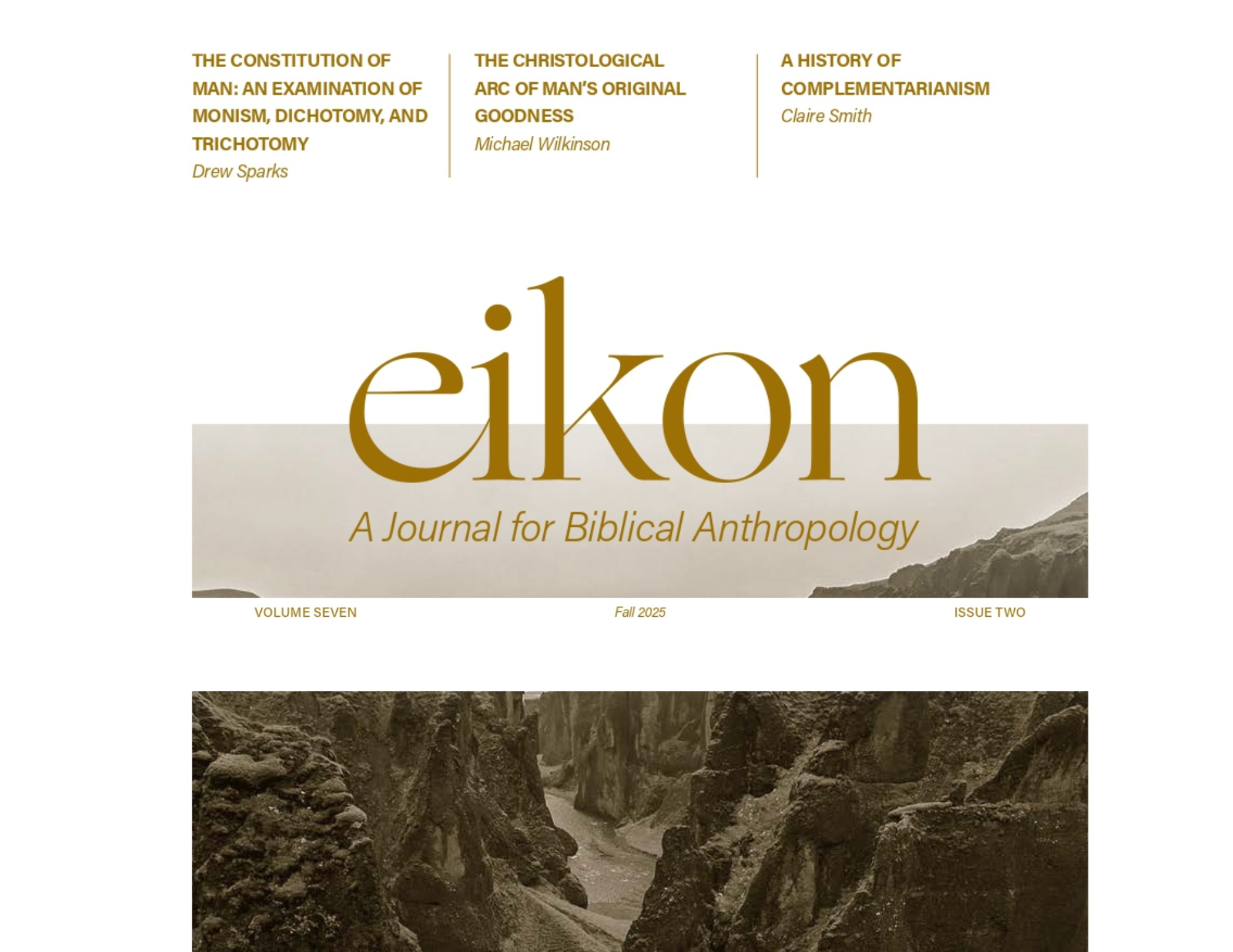
Editor’s Note: The following article appears in the Fall 2025 issue of Eikon.
Church history and doctrinal controversy
The history of the church can largely be outlined in a history of doctrinal controversy and challenges to “the faith that was once for all delivered to the saints” (Jude 3). By this we should not be surprised. The Apostle Paul himself warned young Timothy that “in later times some will depart from the faith by devoting themselves to deceitful spirits and teachings of demons” (1 Tim 4:1), and that “the time is coming when people will not endure sound teaching, but having itching ears they will accumulate for themselves teachers to suit their own passions, and will turn away from listening to the truth and wander off into myths” (2 Tim 4:3–4). In a gut-wrenching moment, Paul informed the Ephesians elders, “I know that after my departure fierce wolves will come in among you, not sparing the flock.” From there it gets worse: “and from among your own selves will arise men speaking twisted things, to draw away the disciples after them” (Acts 20:29–30; see also 2 Pet 2:1). In addition to “the ignorant and unstable” who “twist” Scripture “to their own destruction” (2 Pet 3:16), Paul predicted that from the elders themselves — those tasked with teaching, leading, and shepherding God’s people — will come those who twist the Scriptures to lead away members of the flock.
Of course, this was not merely a future issue for the Apostles. The New Testament itself identifies false teaching as a contemporary problem, presenting the occasion for much of what is written in it. Paul contended against the Judaizers who demanded circumcision for justification (Galatians); the author of Hebrews sought to convince believers to forsake Israelite worship and to trust in the finished work of Christ; and the Apostle John warned against “false prophets” and “antichrists” — those who deny that Jesus is the Christ (1 John 4:1–3). Examples could be multiplied.
As one looks beyond the apostolic era, we see theological struggles continue as the early church became embattled in the defense of the gospel against Gnosticism, Sabellianism, Arianism, and Pelagianism, to name but a few early heresies. Each of these errors required direct confrontation, refutation in accordance with biblical truth, and a positive statement of the Scriptural position. Some of these controversies resulted in distinct creedal statements, such as the Council of Nicaea (AD 325), Constantinople, (AD 381), and the Council of Chalcedon (AD 425), each intended to clarify the biblical teaching in response to Trinitarian and Christological errors.
The middle ages, as we would expect, brought no rest to this situation. The definition, nature, and leadership of the church took center stage; an intense confrontation with Islam ensued, debates over the use of icons proliferated; and, all the while, some of the older trinitarian heresies continued. The Reformation, which began as a renewal movement within the church, turned into an all-out brawl over the authority of the church, the Scriptures, and the doctrines of Christ and salvation — among others. In more recent times, the Enlightenment and modernity ushered in new challenges to the faith — those that question not only the authority of the church or the reliability and authority of Scripture, but whether or not God even exists.
This anthropological moment
These modern challenges have brought us to a particular moment — an “anthropological moment” — as my Doktorvater wrote in the first of this series of Ancient Paths essays.[1] It was his contention that we are not only in an anthropological moment, but that the church has had prior such moments in its history: “It would be easy to think that the church has never been in such a place before — but such a thought would be wrong. The earliest heresy which consumed much of the church’s energy, Gnosticism, was first and foremost concerned with anthropological matters.” Furthermore, as Haykin pointed out, the issues of marriage and celibacy were critical issues during the Reformation. “In other words,” Haykin argued, “our anthropological moment is not without precedent.”
In agreement with Haykin, we justifiably call ours an anthropological moment. We do so not because it is the only area of biblical faithfulness under fire, but because it is the place most under siege by our spiritual Enemy. In other words, it is the area of biblical teaching that right now, more than any other, stands as the focal point of apostasy.
There is a reason we refer to our time as an anthropological moment rather than, for example, a “Trinitarian” one. Notwithstanding your baseline trinitarian heresies that exist in every generation, I am aware of few pastors, churches, or whole denominations that have recently descended from faithful to fallen as a result of anti-Trinitarian pressures. Yet we daily see examples of anthropological apostasy in churches and entire denominations. Meanwhile, these apostates’ orthodox Trinitarian statements remain safely intact.
Furthermore, the wider culture is not concerned about such teachings. Proving proof of concept, Ryan T. Anderson recently stated, “Amazon won’t refuse to sell your book because of your Christology or your Trinitarian theology.” But, as he knows all too well, “Amazon will refuse to sell your book” if it violates the prevailing culture’s anthropological orthodoxy.[2] And even more poignantly, Charlie Kirk was not martyred primarily for his orthodox beliefs in the Trinity, Christ or any other — but for his teaching on biblical anthropology.
C.S. Lewis creatively illustrated the foolishness and failure of misunderstanding the times in The Screwtape Letters, writing, “The game is to have them all running about with fire extinguishers whenever there is a flood, and all crowding to that side of the boat which is already gunwale under.” We must resist falling prey to such a tactic that would lead us to neglect the “real dangers” around us.[3]
Embracing our anthropological moment
It is therefore not a question of what moment we live in, but how we will live in it. This question is especially important for those who bear the responsibility to teach, write, and lead our churches and parachurch institutions. I dare say that our faithfulness will be proved by whether or not we rise to meet this moment.
A quote often misattributed to Martin Luther powerfully makes this point:
It is the truth which is assailed in any age which tests our fidelity. It is to confess we are called, not merely to profess. If I profess, with the loudest voice and the clearest exposition, every portion of the truth of God except precisely that little point which the world and the devil are at that moment attacking, I am not confessing Christ, however boldly I may be professing Christianity. Where the battle rages the loyalty of the soldier is proved; and to be steady on all the battle-fields besides is mere flight and disgrace to him if he flinches at that one point.[4]
Our heroes of the past unflinchingly took to the battlefield at the point of attack. Athanasius defended the deity of Christ, Luther preached justification by faith alone, Tyndale translated the Scriptures, Spurgeon exposed the heresies of modernism, and Bonhoeffer opposed a genocidal dictator. These and many more demonstrated their loyalty by confronting the errors of their day and confounding them with the light of Christ. To speak more colloquially, they knew what time it was and acted accordingly (cf. 1 Chron 12:32). And they did so at great cost. Athanasius endured numerous exiles, Luther faced a death sentence, Tyndale was burned at the stake, Spurgeon was alienated, and Bonhoeffer was martyred.
It remains for us to follow in the ancient paths they trod of courage and conviction. These paths require each of us, in accordance with our giftings, calling, and station, to be willing to pay the cost of discipleship. We must be willing to endure the painful conversations, ostracization, cancellation, economic deprivation, and loss of “Respectability” among our peers. In the end, we must be willing to die (Matt 16:24–26).
Let us not be fooled. We cannot roar like a lion in every domain of theology but remain silent or whimper on those issues of greatest importance in our times and be counted faithful. The watchman must sound the warning (Ezek 3:16–21). The soldier of Christ must meet the enemy’s attack on the battlefield. Let us, then, take our stand in the anthropological battle that is raging against the church. For anything less is “mere flight and disgrace.”
[1] Michael A.G. Haykin, “This Anthropological Moment,” Eikon: A Journal for Biblical Anthropology 1.2 (Fall 2019): 6–7.
[2] Ryan T. Anderson and R. Albert Mohler, Jr., “In the Library: Ryan T. Anderson,” AlbertMohler.com, September 24, 2025, https://albertmohler.com/2025/09/24/in-the-library-ryan-t-anderson/.
[3] C.S. Lewis, The Screwtape Letters (New York, NY: Harper One, 2001) 138, 137.
[4] The quote derives from a fictional work about the life and times of the German Reformer, Martin Luther. Elizabeth Rundle Charles, Chronicles of the Schonberg-Cotta Family, By the Two of Themselves (New York, NY: Dodd, Mead, & Company, Publishers, 1868), 321. https://www.gutenberg.org/files/36433/36433-h/36433-h.htm#XIX.
Share This Article



